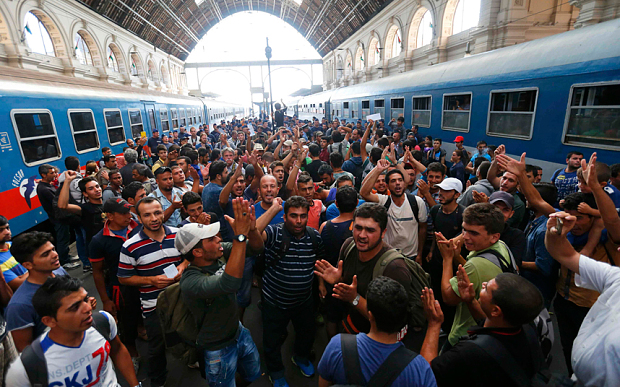Migrant Crisis Has EU In A Quandary
The recent migrant crisis at the European Union has reached a new high as hundreds of migrants protested at the Eastern Railway Terminus of Budapest demanding to be given permission to travel into Germany. It was the biggest inflow of migrants into the EU.
Hundreds of people waved tickets while shouting “Germany!” outside the train station. They later sat down in front of the police barricade set up along the entrance of the station. The recent crisis is similar to the refugee crisis during the 1990s Balkan wars, which divided the EU since it does not have a procedure in dealing with the arrival of thousands of refugees.
Germany is expected to accept the largest number of refugees in the latest EU migrant crisis. The EU rule wherein asylum seekers should apply in the EU country they enter was suspended for refugees escaping the civil war in Syria. However, with the entry of thousands of migrants into Rosenheim and Munich from Hungary and Austria, Germany said the rule is still operational and urged other EU countries to apply it.
Most of the refugees escaping violence and poverty typically arrive at the eastern and southern borders of Europe. They would move on and seek asylum in more affluent countries in the EU by crossing illegally within the bloc since it does not have any internal border controls.
Hungary has become a major flashpoint in this recent migrant crisis since it is the main location where migrants enter after travelling through the Balkans over land. While the Budapest train station was reopened after it was shut down temporarily, migrants were not allowed to enter. The recent decision contradicted an earlier move where Austria and Hungary allowed undocumented migrants to travel to Germany. Zoltan Kovacs, a spokesperson for the government, said the closure was meant to enforce EU law. However, it was not easy to enforce the law as around 2,000 people camped outside the station in 40-degree Celsius heat.
Twenty-year-old Marah of Syria said her family was able to purchase tickets for Vienna. She said there are thousands of them camping outside the station and have nowhere to go. Asylum seekers are required to apply in the first country they enter into the EU and should stay in the country until the applications are completely processed under European laws. These laws are also called the “Dublin rules.”
However, the countries where asylum seekers normally enter have indicated that they are not capable of processing applications of this magnitude. An announcement by Germany last month indicated that Syrians arriving in other EU countries would be allowed to apply for asylum without having to go back to the country where they entered.
A spokesman for the Interior Ministry of Germany said the decision in the recent migrant crisis emphasizes the “humanitarian responsibility of Germany” for these refugees.
The Dublin rules were not suspended by Germany, the spokesman added, and EU countries are expected to enforce them. European leaders have called on EU members to properly organize the migrant crisis where there was an extraordinary influx of refugees.
Chancellor Angela Merkel of Germany said refugees fleeing persecution or war should be fairly distributed to EU countries based on their size, economic strength and productivity. Merkel and Prime Minister Mariano Rajoy of Spain said a list of safe countries should be drawn up by the executives of the European Commission to facilitate the identification of migrants who are actual refugees. Plans are currently being prepared by the EU executive to share out refugees to different EU countries while speeding up the deportation of unwelcome migrants.
EU Commissioner for Migration Dimitris Avramopoulos said some countries were initially reluctant, but changed their minds since they share the same problem with other EU countries. Thousands of migrants have died while travelling across the Mediterranean into Europe this year. Last week, 71 dead bodies were discovered inside an abandoned vehicle in Austria, which highlighted the perils facing asylum-seekers in the most recent migrant crisis.
Austria police said 24 Afghani teenagers were freed from a van that was welded shut. The Romanian driver of the truck was arrested. Vienna police spokesman Thomas Keiblinger said everyone was crammed inside the van, which was “like a rolling prison cell.”
The recent migrant crisis allowed political parties opposing migration to gain ground in Europe. The border of Hungary was recently reinforced with a razor wire fence while police presence was increased. Over 140,000 individuals were able to cross from Serbia to Hungary since the start of the year.
Antal Rogan of the Fidesz party said the “very existence of Christian Europe” is threatened. Rogan added that their children should not grow up in a “United European Caliphate.” Labor Minister Andrea Nahles of Germany said Germany will have to shell out another 3.3 billion Euros or $3.7 billion with the influx of migrants and refugees.
Emilia Mueller, Bavarian labor and social affairs minister, said an arrival and deportation center will be set up by her state form Balkan migrants who may not acquire refugee status but would be unable to cope on their own. She said the system in Europe is no longer working with the most recent migrant crisis, which is quite clear with the situation in Hungary.
